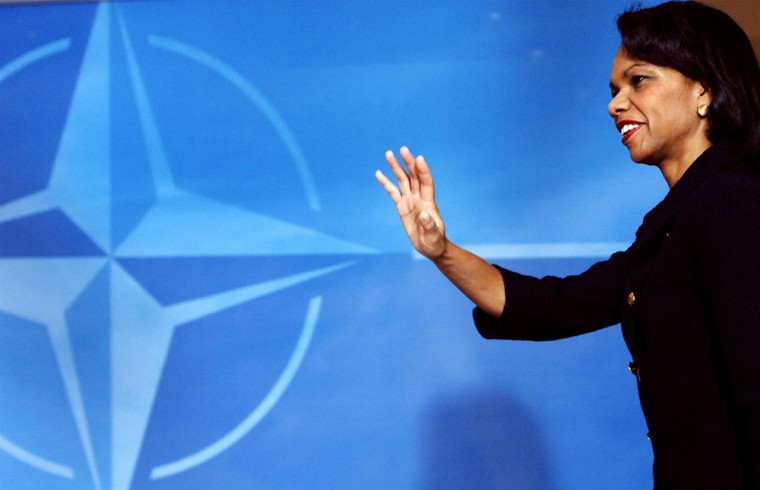The Bush administration plans to ask Congress for $10.6 billion for Afghanistan, a major increase aimed at rebuilding the country and strengthening government security forces still fighting the Taliban five years after the U.S.-led invasion.
Secretary of State Condoleezza Rice said all but $2 billion of the money is for security needs. She detailed the plan as she prepared to attend a NATO gathering meant to plan for an expected Taliban military offensive in the spring.
Among other issues Rice was to raise Friday with her NATO colleagues were the divisions within the alliance on sharing the burden in Afghanistan. Some NATO countries have shown a greater willingness than others to send troops to areas of conflict.
“We’re looking to others to step up their effort with us, step up across the board,” Richard Boucher, Assistant Secretary of State for South and Central Asia, told reporters Thursday.
‘Redouble our efforts’
The Bush administration funding proposal follows a year in which Taliban forces launched surprisingly fierce attacks across the country, poppy production expanded and relations worsened between Afghanistan and Pakistan, a key ally in the fight against global terrorism.
“The challenges of the last several months have demonstrated that we want to and we should redouble our efforts,” Rice told reporters flying with her to Brussels for the NATO sessions.
The U.S. aid package would fund training and equipment for about 70,000 new Afghan army soldiers and 82,000 national police, among other uses, a State Department official said. The official spoke to The Associated Press on condition of anonymity because President Bush will make a formal budget request next month.
The United States wants to strengthen the democratic government of Afghan President Hamid Karzai, who has struggled to extend political control throughout his country and quarreled with Pakistani President General Pervez Musharraf.
The new U.S. money would be on top of $14.2 billion in aid the United States has already given to Afghanistan since the 2001 U.S.-led invasion that toppled the Taliban government.
Rice said that of the total, $8.6 billion would be for training and equipping Afghan police and security forces, and $2 billion would be for reconstruction. The money would be spent over the next two years.
U.S. troop boost
The aid proposal comes alongside a move toward increasing the number of U.S. forces in Afghanistan.
The Defense Department has said that 3,200 soldiers from the New York-based 10th Mountain Division already in Afghanistan would have their tour extended by four months. In a visit to Afghanistan last week, new Defense Secretary Robert Gates indicated he is likely to ask Bush for more troops for the country.
There are about 24,000 U.S. troops in Afghanistan, the highest number since the war began in October 2001. About half are under the control of NATO, which is gradually gaining more control over operations there.
The NATO-led force is about 20 percent short of the troops levels pledged by its contributing nations.
Casualties in Afghanistan have risen sharply in recent months as an emboldened Taliban widened military operations and suicide attacks. Some 4,000 people died in insurgency-related violence in Afghanistan last year, according to numbers from Afghan, U.S. and NATO officials.
A springtime push caught international forces somewhat off guard last year, but the Taliban movement has not been able to translate military gains into a resurgent political force like the one that imposed harsh Islamic law on Afghanistan in the 1990s.
Anti-drug efforts
Some of the U.S. money will go to expand drug-fighting efforts.
Officials in the Afghan capital of Kabul said this week that despite pressure from the United States and a record crop last year, the country’s heroin-producing poppies will not be sprayed with herbicide. Afghan officials said there would be increased efforts to destroy poppy crops with traditional techniques — typically sending teams of laborers into fields to batter down or plow in the plants before they can be harvested.
Fueled by the Taliban, a powerful drug mafia and the need for a profitable crop that can overcome drought, opium production from poppies in Afghanistan last year rose 49 percent to 6,700 tons. That’s enough to make about 670 tons of heroin, or more than 90 percent of the world’s supply and more than the amount that the world’s addicts consume in a year.
